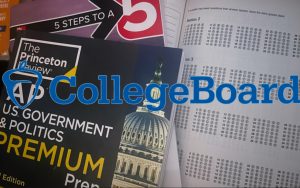Two Schools of Thought
April 23, 2020
Written by Logan Cummings|
Photos by Logan Cummings and Leo Woods|
Recently, I debated with senior Caleb Vath, a good friend of mine. We discussed the purpose of education, and how we may reform the current system in order to meet the needs of the students. In our discussion, we thoroughly explain our approaches to create an effective system of education.
Logan: Caleb, what do you think is the main purpose of school? Why do we learn what we learn?
Caleb: Well I think that school is meant to teach us about the world we inhabit and pass down our collective knowledge as well as expose us to new ways of thinking.
L: Do you think there are things that the school teaches us that aren’t really important? Are they any things that we should be taught that we aren’t?
C: Off the top of my head, I can’t think of anything grossly unnecessary although we could look more into that. I’m sure we could always add more to the curriculum although mostly I’ve heard that people want to be taught more practical skills such as how to pay taxes.
L: I’m definitely more partial to the idea of schools focusing on more practical stuff. After all, we end up in the “real world” after school where we have to fend for ourselves. Of course, most people have family with plenty of experience that can guide them through confusing things in terms of finances, homeownership, family, etc. What do you think?

C: I think such practical skills as you mentioned are definitely important. I wouldn’t go so far to place them above what we already learn. After all, as you mentioned these more practical skills are usually taught by families or self taught in some cases through available resources like Google. I wouldn’t be against adding classes more oriented towards these practical skills, I just would put them as equally important as our usual subjects, not above. Not to say what we usually learn in school isn’t practical, I’m just using practical to refer to topics such as how to do taxes and other related areas. You mentioned classes you thought were secondary or not necessary, have any specific in mind?
L: I definitely think that classes such as calculus and advanced English courses (junior and senior year) are unnecessary. Of course, these could be crucial to students who want to further their education in those fields. I think that there should be an option for those classes, but I don’t think it’s necessary for students to take those classes (or be expected to). Seniors don’t have to take calculus; they have the option to take prob & stat or just forego a math class. However, guidance advises students to take an extra year of math because colleges like that. I just don’t think extra education should be forced upon students who don’t want to dig deeper into a subject.
C: These classes are helpful in allowing you to engage in your world to a greater extent than if you were just taught the very basics. Science classes for example: Imagine news articles on new scientific discoveries that you could better understand with a better background in science. Studying the environment you’ll be more informed in a discussion on climate change. Or health sciences could be useful for understanding what foods you want to consume, learning how GMOs work or what nutrients would be best for you. You can get by without knowing all that of course, and I don’t want to force people to have to learn this. I highly recommend that you pursue these additional subjects, not because they look good for college, but because they are actually useful.

L: Some people simply aren’t passionate about learning. Should we tell them they have to learn this, this, and that in order to graduate and tell them they can pick a few other options in specific areas? Or should we give students more freedom in deciding what they want to learn beyond the core subjects? I don’t think anybody should be required to learn something that simply furthers their understanding of the world because it’s such broad criteria. You could apply that line of reasoning to any subject. Should students be required to take geology so they can better understand rocks they see outside? To better understand some materials from the earth? Of course, this is interesting and furthers people’s understanding of the world. That being said, I think you’d be hard-pressed to find someone who thinks geology should be a required class (or in a set of required classes). Our graduation requirements demand a certain number of credits for the core subject areas, offering students choices within each field, but limiting the breadth of their education as a whole. Do you think this system works? Is it too restrictive in your opinion?
C: I wouldn’t say this system is too restrictive at all. After all, it gives students the freedom to explore courses in any area of science so it’s not like you’re required to learn geology from your example. This system provides a well-rounded range of subjects. You mentioned giving students freedom to explore subjects that interest them, and this system provides that freedom. True, it does direct them with a required number of credits in different broad subjects. I think this is good because it forces some exploration of different areas. After all, you can’t tell what subject you might find important or simply just interesting if you’re not exposed to it at all. How would you change the system? I have the impression you’re not content with it.
L: Think about it this way: what’s more important? A fourth-year of English? Or one year of finances? If we rank the importance of subjects based on how much they allow us to engage in the world, then wouldn’t you say that we don’t need to put so much focus on English and so little focus on finances? If the purpose of having these subjects is to make students well rounded, then why are they only required to take 1 credit of any creative classes and 1 credit of any tech classes while they’re required to take 2 credits of science, 3 credits of math, and 4 credits of English? I just don’t think it’s fair to direct so much attention toward one subject over another, especially if the goal is to produce well-rounded students. Back to my main point about practicality, I think classes that cover necessary and applicable life skills should be mandatory. Nobody can question whether or not they’re necessary. I doubt anybody would object to the importance of learning about how to pay taxes or manage a family, home, and bank account. With the system we have in place, students constantly mull over how unnecessary and irrelevant many fields of study are in school. They want to learn more important things that will help them down the road, not just areas of interest to broaden their understanding of the world.

C: As I said I don’t want to place any area of learning over another. I think we should add new courses that will address the practical topics you mentioned. We should have a more equal distribution of credits across these new fields. I think they’re unequal now simply because the introduction of such fields such as finances are relatively new to traditional education curriculums. It’s not a situation of either these practical classes or the traditional areas of learning, we can add these practical areas to the curriculum. It doesn’t have to be a trade-off.
L: If you don’t think that any subject or field of knowledge has more worth than another, then why do we set requirements at all? Couldn’t you say that any course offered is beneficial in its own way and can’t be compared to the other courses? Ignoring differences in importance for classes doesn’t work if you want to have established boundaries for how many classes of a certain subject you need to take. If you can say that English is more important to learn than geology because it offers the average person more, then why can’t you apply the same reason when comparing finances to a fourth year of English?

C: I’m saying the two camps of thought, the traditional subjects of a typical curriculum and the new, practical subjects, are both of equal importance. This doesn’t mean we won’t have requirements though. A number of credits or classes doesn’t make one class more important than the other. It comes down to the diversity and complexity of a subject. Science, for example, has many courses because of its wide range of subjects. Some classes might not need more classes, or thus as many credits, because it’s subject matter can be understood with fewer classes. You can’t have a four-year course on how to pay taxes for example. I’m not saying either of those two camps are more important than the other. There are differences in class importance I’m sure when you explore classes outside these two camps and even when comparing classes within the same basic camp. Exploring the specific differences in the importance of classes is a topic for its own time but the two camps are of equal importance in my view. Although they can still be of equal importance but have a different number of classes.
L: So would you say that if a subject is more complex or in-depth, then more classes should be required for it? What makes a subject more complex? The broadness of the field, its applicability, or the variety of skills we learn in such classes?
C: What makes a subject complex is a big discussion, worthy of its own debate. Although to be brief in my response I would say all three would factor into the complexity of a course. What about you though? I’ve said I think the traditional topics of education and new practical skills are equally important. What are your thoughts on education?
L: My main argument is that we should not be obligated to take a certain number of classes in a certain selection of fields. I think that learning practical content that is necessary later in life is more important than other areas of interest. Considering we’re legally obligated to go to school, I feel like we should get more out of it than things that could be useful or just broaden our scope of knowledge. Of course, I do think basic courses should be taught in the traditional subjects because, as you said, it’s good to be well rounded. I just think we’re too stuck to that tradition and students should have more freedom to choose what they learn. I think a good way to do this would be to make mandatory courses for the first two years of high school to cover the core subjects, and leave the last two years full of opportunity for students to branch out and experiment with whatever classes they please. This is similar to college except in high school, you can try a bunch of subjects at a less advanced level while in college, you’re expected to specialize in one or two fields. Having fewer requirements leaves more room to explore, which you seem to value in terms of thinking. I think we have the same basic idea that students should learn a variety of things. I suppose the main disagreement here is that I think they should have more freedom in that exploration, while you think confining them to certain areas forces them to branch out.
Following this discussion, I presented a poll to my followers on Instagram. I asked, “In your opinion, what should the MAIN purpose of education be?”. The options were “1. Pass on a variety of knowledge, encourage exploration of different areas (i.e. science, history, advanced math)” and “2. Teach real-world skills and pass on practical knowledge to navigate life (i.e. finances, government/laws, cooking, childcare). Out of 100 voters, 28 of them chose option 1 and 72 of them chose option 2. The voters included Morgan students, students from other high schools, and college students. Many of the voters messaged me expressing that both options were important.
Afterwards, I posted a question for my followers to answer: “How could we improve the education system?” Senior Jenna Kareliussen suggested that we “require classes like personal finance and maybe even an ‘adulting class.'” Sophomore Ryan Baker suggested that we “make requirements for certain things less rigorous to provide more space.” He continued to explain that having fewer requirements will allow students more of an opportunity to choose classes that teach important life skills. Similarly, senior Leo Woods suggested that we “get rid of certain graduation requirements as the grades continue.” Junior Emma Lindsay suggested that we “actually value the students’ voice and try to accommodate for what they say, not ignore it.”
Soon after this, I released another set of polls to the same audience. The first poll asked, “do you feel that high-school provides good academic preparation for college?” Out of 72 voters, 33 said “yes” and 39 said “no.”
The second poll asked, “do you feel that high-school provides good preparation for navigating the ‘real world?'” Out of 95 voters, 1 said “yes” and 94 said “no.” The “yes” vote came from a middle-schooler. If only high-schoolers and alumni are considered, then 100% of voters say that high school does not provide good preparation for students to navigate the real world.
The third poll asked, “do you think your parents/guardians provide good preparation for navigating the ‘real world?'” Out of 97 voters, 69 said “yes” and 28 said “no.”
Finally, I posed one more question about school: “If you could add/remove required classes in high school, what would you change?” Multiple students urged the removal of freshman course, suggesting that we replace it with personal finance as a required class. Topics such as budgeting, taxes, entreprenuership, and accounting were all mentioned. Junior Sarah Gaetano said that we should lessen the requirements for physical education: “I feel like maybe one semester of gym is enough.” Senior Andrew Daly and sophomore Jacob Bardinelli both suggested that we have less English in the schedule. Morgan graduate Ashley Annicelli said that we should reduce “crazy hard math” requirements because students “don’t need that unless [their] career requires it.” Other suggestions included requiring classes about family studies, applying for colleges, and cooking. There was even a suggestion that we replace junior portfolio with community service.
Considering students have plenty of suggestions to make for Morgan’s curriculum, it’s clear that there is room for improvement. Many students think that the school system could do better in preparing them to tackle “real-world” issues and responsibilities, and that’s where their curriculum suggestions stem from. On the other hand, some students feel that it isn’t the school’s job to prepare students for life, especially considering that parents are expected to provide that kind of education. With these two different perspectives on the purpose of school, it’s hard to determine how much change should be made. Is school already as effective as it can be? Or should students be getting more out of it? Either way, it’s a discussion that should be held by students, parents, teachers, and administrators alike to get an understanding of what’s in the best interest of our community. Fortunately, the administration has already discussed how we can make improvements in the graduation requirements for the students.
Of course, these views on the curriculum and the purpose of compulsory education are not unique to The Morgan School; school districts across the nation could be improved by considering these topics. Considering schools need to meet criteria set by the state and the Department of Education, this issue is too far up in the hierarchy to simply be solved by the schools.
Personally, I’ve seen plenty of complaints online (typically through memes) about how students don’t learn many practical things in their education. If this is a view held by a wide range of students in the country, then it would definitely be beneficial for the schools to listen to what the students have to say and relay the information to those farther up in the hierarchy. Understanding the needs of the students would enhance the educational experience, and (hopefully) create a group of people that are grateful for what they have learned because they see a purpose in it. As long as administrators and educators are mindful of this, the students will be better off in the long run.











